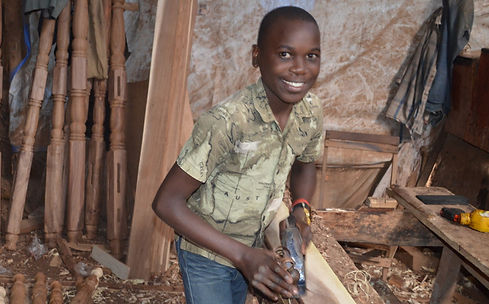
The Carpentry Project
Our Carpentry Project provides young men and boys in the slums with the vocational and entrepreneurial skills they need to earn a regular income, support their families, and move out of poverty.

The Project
The Carpentry Project includes a full-time 12 month course delivered by a trained carpentry instructor. Our skilling project runs in Katanga Slum and was set up to support young males who had not completed school, teaching them vocational and entrepreneurial skills. The workshop is a specifically built training facility for our Carpentry project and can hold up to 20 students a day.
When students graduate from the carpentry project they receive an official government recognised qualification that is accredited by Uganda's Directorate of Industrial Training and the required start-up equipment to start their own business or employment. This opens up a door of employment and offers graduates the opportunity to financially provide for their family and community and break the cycle of poverty.
The context
Up to 70% of young people old enough to work in Uganda are unemployed and Kampala’s slums have the highest urban unemployment rates. Those who are able to work face instability in their employment, with the majority relying on low paid informal or casual labour which does not provide a reliable income. With the onset of pandemic lockdowns, opportunities for this work vanished for months at a time. Recently, food prices have risen by 400% meaning low incomes have to stretch even further. This leaves young people vulnerable to exploitation and crime - while girls are at risk of gender-based violence or sexual exploitation, boys are at risk of high rates of crime, drug and alcohol abuse found amongst young men in Katanga slum, causing negative impacts on their families and the wider community.
We’ve worked closely with the community in Katanga for years; from this we know that a lack of education and vocational skills are key factors that contribute to the cycle of poverty that young people find themselves in. We also know that alongside our projects supporting women and children, we need to engage with men as a powerful force for change within this community.


Our Impact
Each year 20 students graduate from our Carpentry Projects. After completing the course graduates have improved skills in carpentry and business, and have the tools to set up their own business.
In the long run this increases their chances of employment in the future and creating financial stability by the increased income these skills provide. For many of our students this means they go from an income of $0 to regularly earning $300/month.
Sandra's Story
"When they declared the closure of all schools, I started imagining what was next for my son. It was important to keep him busy by engaging him into a new and productive skill. I linked my son to the Kids Club Kampala carpentry project. I am so proud seeing him do amazing furniture like stools, chairs and others. He likes the skill too and he has started earning out of it. I am very thankful to Kids Club Kampala for the opportunity given to my son."
The Kids Club Kampala Way

Why we’re different
Our Skilling Programme is part of the way we are uniquely supporting children in Kampala slums survive and thrive.
At Kids Club Kampala, we believe that every child is unique, special and deserves to have the opportunity to reach their full potential. Our work is based on a holistic approach, where we focus on meeting the immediate needs of children and families in the slums while empowering them to bring about long-term, sustainable changes in their lives. Our approach encompasses four core project areas: feeding, protecting, educating, and skilling.
These four areas are not siloed; they work together holistically to create a supportive environment for vulnerable children and their families. We firmly believe in a holistic approach, ensuring that children and families have their basic needs met (food, safety) so they can fully engage with and benefit from education and skills development. This approach helps them move from merely surviving to truly thriving, as stated in our theory of change.



